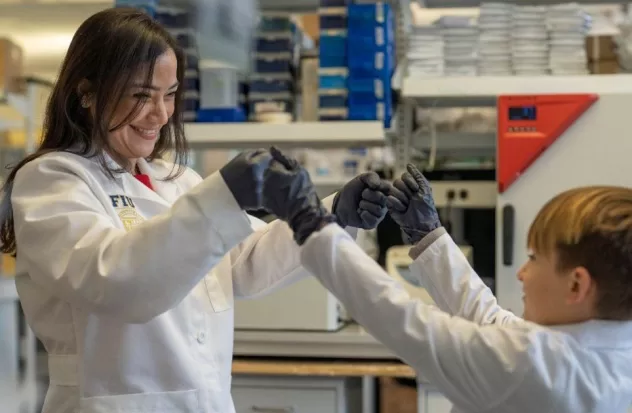MIAMI.- Researchers have developed a functional precision medicine approach that combines genetic testing with a new way to test drugs directly on cancer cells. The results of the clinical trial were published today in Nature Medicine.
As a result, 83% of children who received treatment guided by the results of this strategy showed improvement, including 8-year-old Logan Jenner, whose treatment for recurrent leukemia was successful with Azzam’s new guided strategy.
“The results are encouraging because when cancer returns, its treatment is much more difficult. Seeing improvement in 83 percent of patients is extremely promising,” he stated. Azzamassistant professor of environmental health sciences at FIU Robert Stempel College of Public Health and Social Work and board member of the Society for Functional Precision Medicine (Society for Functional Precision Medicine), who led the study. “This could be the way to transform cancer into a more manageable disease.”
About 2 million people are diagnosed with cancer each year in the United States, according to the National Cancer Institute. This disease is expected to claim the lives of almost 30 percent (more than 600,000).
Innovative strategy
Azzam’s pioneering strategy has several advantages over existing precision medicine processes: faster results and more treatment options in the hands of doctors, among others.
With Azzam’s strategy, a blood or tumor sample is taken and cancer cells derived from the tumor are obtained in the laboratory, keeping them in culture so that they best represent the cancer in the body. The cancer cells are then directly exposed to more than 120 drugs approved for cancer and other purposes by the Food and Drug Administration (FDA), to determine which drugs are most effective in killing the cancer cells. These medications can also be tried in various combinations recommended by the clinical team. This process takes approximately one week.
“Azzam’s laboratory strategy eliminates the guesswork and produces a list of the most effective drugs an oncologist can use,” said Tomás R. Guilarte, dean of the Stempel School and one of the authors of the Nature Medicine article. “The results of this study increase our understanding of which treatments work best to treat each cancer patient and their specific needs.”
Logan’s case
Logan Jenner was diagnosed with acute myelogenous leukemia at age 3. He underwent chemotherapy and a bone marrow transplant. However, the cancer returned after 14 months.
Logan’s oncologist and one of the study’s investigators, Dr. Fader, enrolled the boy in the clinical trial.
“That’s important because we’re talking about a child with cancer who was getting worse every day.”
Results from Azzam’s lab revealed which combination would have the greatest effect on Logan. Also very valuable was that the results indicated that, without affecting the effectiveness of the treatment, Idarubicin could be stopped, which in very high doses is known to cause cardiac toxicity. Logan entered remission after 33 days of treatment guided by Azzam results, compared to 150 days with the previous treatment. Two years later, Logan is cancer-free.
Clinical trials
Using this strategy, this clinical trial provided treatment recommendations for the 19 participating patients. Six of them received outcome-driven treatment and five, including Logan, had better survival outcomes over the course of the study. More clinical trials to offer personalized treatments to children and adults with cancer continue.
“Undoubtedly this study offers a hopeful light in the promising advancement of cancer treatment,” said Arlet Maria Acanda de la Rocha, FIU postdoctoral associate and lead author of the study. “We can offer new treatment options, especially to patients who have recurrent stage cancer or difficult-to-treat cancers and who have exhausted standard treatment options.”
The study is of particular relevance because the participants were mostly members of ethnic minorities, who may respond differently to FDA-approved medications. Azzam leads a research project to reduce health disparities among pediatric cancer patients that is funded by the National Institute on Minority Health and Health Disparities as part of the Center for Research in Minority Institutions (Research Center in Minority Institutions) by FIU.
Additionally, with a $2 million allocation from the state of Florida, Azzam’s lab is poised to be the first major federally certified laboratory dedicated to offering functional testing of cancer drugs in Florida.
Source: FIU







